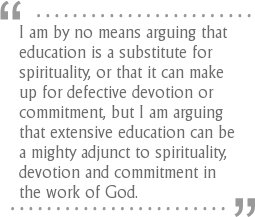"55 percent of America teenagers are living in non-traditional family structures marred by divorce, separation or unmarried parents"
Body
Discussion
“I hope this statue will become a remedy for this secularization”
Body
Discussion
"The 250-175 vote sends the 'don't ask, don't tell' repeal to the Senate"
Body
Discussion
Becoming a True Christian Scholar: Some Recommendations, Part 1
 Reprinted with permission from As I See It. AISI is sent free to all who request it by writing to the editor at [email protected].
Reprinted with permission from As I See It. AISI is sent free to all who request it by writing to the editor at [email protected].
In run-of-the-mill conservative Christianity in general and Baptist Fundamentalism in particular there is, and has long been, an indigenous and deeply in-grained distrust and suspicion of highly educated men within our ranks. But this does not in the least reduce or detract from the great service and essential value such men have provided to Biblical Christianity through the centuries. If we may quote Erasmus (1466-1536) on Christianity’s debt to scholars:
Let it be remembered that the heretics were refuted by the scholars, and much more by the scholars than by the martyrs. By dying for a conviction a man proves only that he is sincere, not that he is right.1
In spite of this historic and continuing debt, there has been a parallel perverse distrust and contempt toward Christian scholars (even devout and spiritually-minded ones) by much of conservative evangelical Christianity. I recall well a conversation I was party to some 25 years and more ago with an independent, fundamental Baptist pastor—a man who himself had been unable to complete even a basic, un-demanding three-year Bible institute degree, a deficiency he had not remedied by extensive personal study in succeeding years—in which he told me that “I just don’t trust men with a lot of education.” As though abject ignorance somehow made a man more spiritual and useful to God!
John Gill (1697-1771) wrote a scathing rebuke of this absurd perspective nearly 250 years ago:
Here I cannot but observe the amazing ignorance and stupidity of some persons, who take it into their heads to decry learning and learned men; for what would they have done for a Bible, had it not been for them as instruments? and if they had it, so as to have been capable of reading it, God must have wrought a miracle for them; and continued that miracle in every nation, in every age, and to every individual; I mean the gift of tongues, in a supernatural way, as he bestowed upon the apostles on the day of Pentecost; which there is no reason in the world ever to have expected. Bless God, therefore, and be thankful that God has, in his providence, raised up such men to translate the Bible into the mother-tongue of every nation, and particularly ours; and that he still continues to raise up such who are able to defend the translations made, against erroneous persons, and enemies of the truth; and to correct and amend it in lesser matters, in which it may have failed, and clear and illustrate it by their learned notes upon it.2
Discussion
Book Review - What is the Gospel?
[amazon 1433515008 thumbnail]
At this time in the history of the church we can celebrate that we have unanimously agreed on the core message and content of the gospel! Or perhaps not, says Greg Gilbert in his new book What Is The Gospel? Right from the start he states, “What is the gospel of Jesus Christ? You’d think that would be an easy question to answer, especially for Christians. My sense is that far too many Christians would answer with something far short of what the Bible holds out as ‘the gospel of Jesus Christ’ ” (p. 15). Unfortunately, after all the time the church has had to study the Bible, there is still confusion as to what the core teaching of the gospel is.
Gilbert gives the four-fold outline through which he lays out the gospel:
- Who made me, and to whom are we accountable? (God)
- What is our problem? (man)
- What is God’s solution to that problem? (Christ)
- How do I come to be included in that salvation? (response)
First, God is the righteous creator. Gilbert rightly contends that if you don’t get God right then you will not get the gospel right. “Everything starts from that point, and like an arrow fired from a badly aimed bow, if you get that point wrong, then everything else that follows will be wrong too (p. 40).” Since God has created us He has the right to tell us how to live.
Discussion
More states enter debate on sharia law
Body
Discussion
Keeping Christ in the Holidays Takes Little Effort
 From the Dec. 2010 edition of the Body Builder, a newsletter published by Highland Park Church, Kokomo, IN. Used by permission.
From the Dec. 2010 edition of the Body Builder, a newsletter published by Highland Park Church, Kokomo, IN. Used by permission.
A number of America’s holidays have Christian overtones, particularly Thanksgiving, Christmas, and Easter. Because these holidays originated as times to celebrate God’s graciousness to us, it is not all that difficult to restore their original spiritual meaning. This will happen only if we value doing so and are willing to expend a bit of energy. I would like to share some considerations and suggestions.
My first consideration is that we become comfortable with the secular. As followers of Jesus Christ, we find ourselves in the world, though we are not of the world. This means we must walk the tightrope of participating in our society and its decent (good or neutral) ways, while at the same time refraining from its wrong ways.
Gift-giving, decorations, Christmas cards, rich treats, a Christmas tree, touring light displays, or gorging oneself with a Christmas meal are all part of the fun. Secular is not necessarily evil, but secular is not enough.
My second consideration is that we remind ourselves that we are not enslaved to traditions that may negate a truly blessed Christmas. We need not incur amazing debts or keep up with our siblings by matching extravagant gifts. Although most of us want Christmas to be a family time, we are free to dissent from family customs when those customs are offensive or counterproductive to our own families.
My third consideration is that we do not expect lost people to appreciate the real meaning of Christian holidays. Although the origin of Christmas, Easter, and Thanksgiving is religious, the Bible nowhere mandates these holidays; in fact, Christians did not celebrate Christmas until centuries after the time of Christ.
I believe God’s children should consider keeping Christ in Christmas, but they should not scold unbelievers who fail to do so. The annual “Christmas War” in our society is really an American/religious rights issue, not a biblical one.
Just as Christians who cannot even list the 10 Commandments often fight hardest to keep them posted in courthouses, so many Christians who gripe about others taking Christ out of Christmas do little to keep Christ in their own family celebrations. This sometimes frustrates me, I must admit. Rather than scolding lost people, maybe should begin sharing the gospel with them.
Discussion